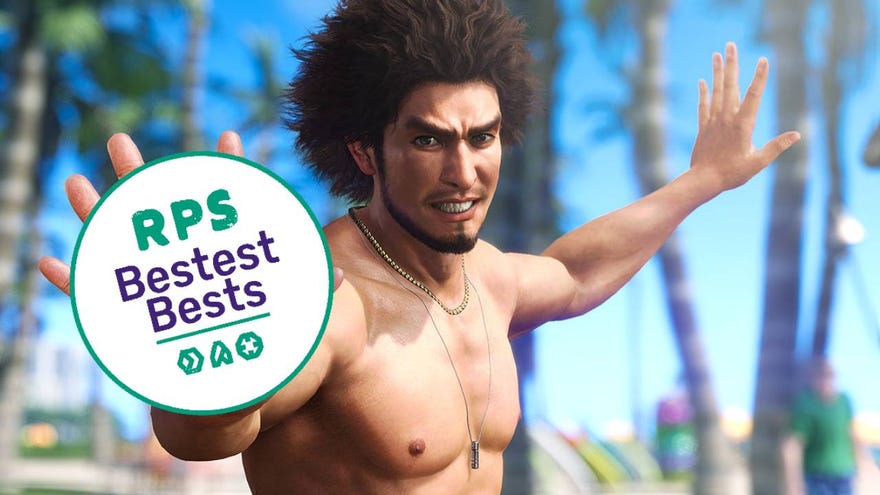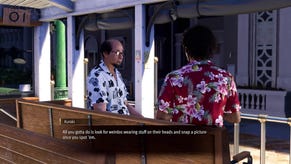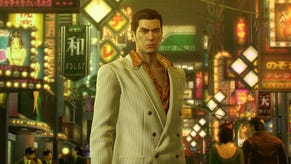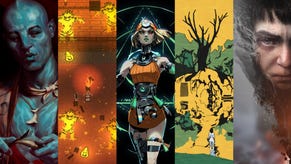Like A Dragon: Infinite Wealth review: thank goodness for Yakuza
I won't need another game for several years
Yakuza: Like A Dragon was a brilliant foray into turn-based chaos, but some of its RPG elements didn't quite lead anywhere. Well, in swaggers the frankly ginormous Like A Dragon: Infinite Wealth to tie off the loose ends and give us a follow-up that links all the best bits of Yakuza into a far more satisfying reward loop. Some of the refinements make for superb silliness, while others are a bit eh - not everything is perfect. But spending time with Ichiban and his pals in the sun-soaked Hawaii and beyond is the real treat. It's a wonderful, happy JRPG and it will never fail to brighten my day. Thank goodness for Yakuza.
Infinite Wealth begins with Ichiban and his pals leading normal lives, having escaped the chaos of organised crime… that is, until they're dragged back in by a chance encounter. I won't get into details, as I'd rather not spoil loads of story beats for you, but I'd say the inevitable pull of the yakuza is particularly well done here and avoids leaning on the classic "we've broken out of prison again, lads" crutch of the past. Instead, it involves the yakuza's dwindling presence in Japan - a sign of the times - and has the emotional hook of a familial mystery. Turns out Ichiban's mother is at the heart of things, with the first clue placing her somewhere in Hawaii.
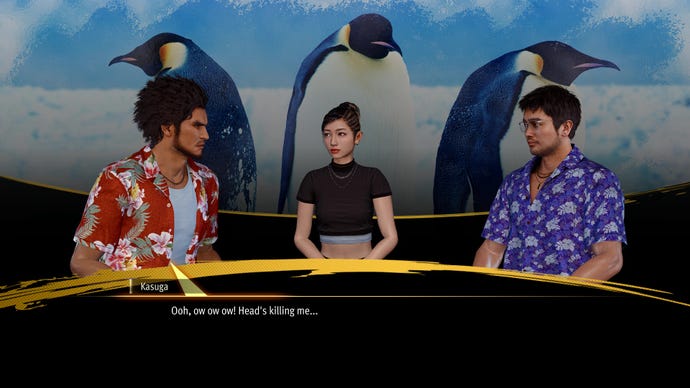
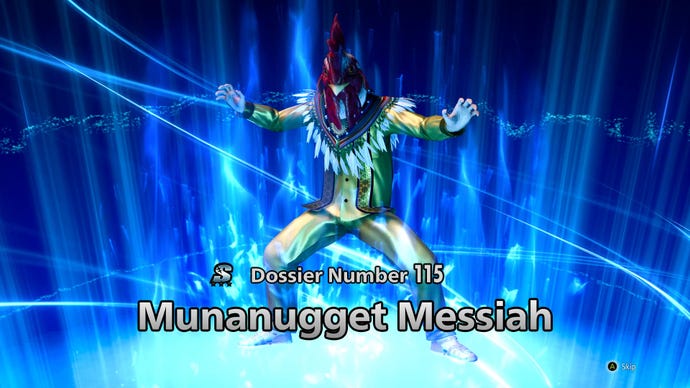
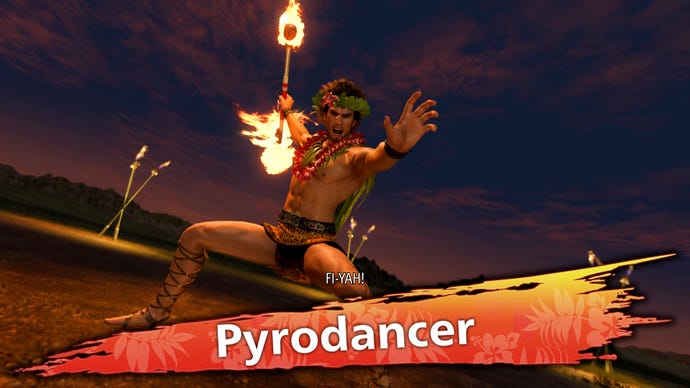
Ichiban's arrival on Hawaii's sunny shores delicately pulls him away from his established party and, at first, cleans the slate. Not only is it exciting when you recruit new pals - a taxi driver who robs you at gunpoint, and a girl who also robs you - it's wonderful to discover how their stories intertwine with Ichiban's past, and possibly, his future. Oh and Kiryu's back, too! Except it's actually really sad because he acknowledges early on that he's suffering from cancer and doesn't have long to live. I was worried he'd been shoehorned in as a playable protagonist and party member for the sake of it. But no, not only does he make for a good dad of the group, his inclusion is a farewell in the best kind of sense: 1) He gets to hurl bicycles at thugs; 2) He finally accepts his vulnerabilities; 3) He's surrounded by friends old and new.
What's wonderful about Hawaii is how it perfectly compliments Ichiban's personality and, to some extent, Yakuza as a whole. It bursts with colour - perhaps too much, as the contrast might blind you during the day - and has various districts with shiny malls, surf shacks, sleaze, and an azure sea you can actually swim about in. It easily sits as one of my favourite Yakuza locales ever, because it also embraces the slow life (a bit like Y6's Onomichi, my all time fave), as you stroll along its coastal paths or hop in a tram with nothing in mind besides basking in the orange glow of the sun set. Just as Ichiban radiates positivity, so does Honolulu.
Later, you'll spend time with Kiryu in Yokohama as he ticks off things on his bucket list. It's a neat way to remix the familiarity of Yokohama through the lens of a legend bowing out - a man who not only imparts knowledge to Ichiban's original gang, but shines a light on how much everyone else has matured around him, too. For those invested in the story, both Ichiban and Kiryu's paths make for all the melodrama and occasional fits of silliness you could ask for.
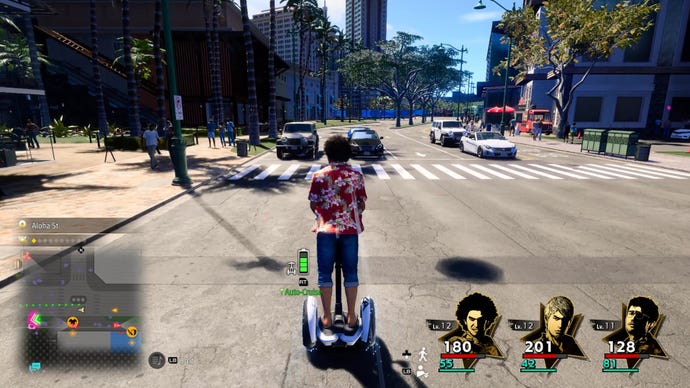
And as the devs' second crack at a turn-based RPG, I'd say Infinite Wealth refines what came before, by making it so that a lot of the character stats from LAD now feed into a tighter reward system. For instance, Ichiban's personality traits (passion, intellect, etc) now tie heavily to unlocking new jobs (classes), and your bond level with pals now determines how many slots you have available for inheriting skills from other jobs. In effect, Infinite Wealth has wrapped Yakuza: LAD's loose end stats into a more motivating loop.
Ryu Ga Gotoku Studio have also added new methods to level up all of these things, except here the quality varies from solid to shoulder shrug. Waving to the same NPCs as you roam Hawaii lets you gradually befriend them, but there's no substance to it beyond seeing bars go up. On the flipside, a hilarious dating app mini game lets you level up your stats by sending "passionate" advances with quick button combos and last ditch decisions. Succeed and you might meet someone nice! Fail and you might get catfished by an oily perv. Or, if the game calls for a bit of grinding, you can supplement it with a roguelike dungeon called the Labyrinth, with procedurally generated halls and rooms of loot to plunder.
You see, there are moments throughout the story where the game's like, "Hey, you might want to reach level 13 and have this sort of equipment before you venture onwards". Infinite Wealth tweaks are additive, sure, but it's still very much an RPG with a straight trajectory, where the story follows one track and won't veer off course no matter what you do. And in a traditional JRPG sense, it's reliant on the occasional grind, because it's only your party's level that truly lets you push forwards.
Yakuza LAD's had a mid-game slump because of this, and it was a bit naff, but the Labyrinth's roguelike hook, combined with tweaks to general EXP rewards, has dialled down Infinite Wealth's need for levelling excursions. Or, if you prefer, transformed these trips from slightly unbearable to a welcome jaunt. But Infinite Wealth is still a Yakuza game with Yakuza-isms that will grate for some. As well as the grind, expect some exceedingly long cutscenes, repetitive strings of fights through offices, and the incitement of rage from seemingly everyone on the streets.
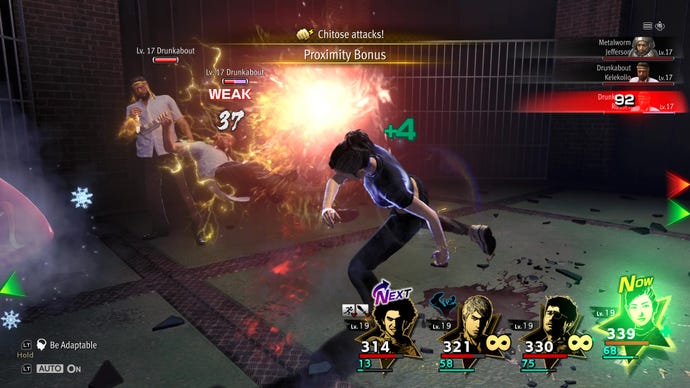
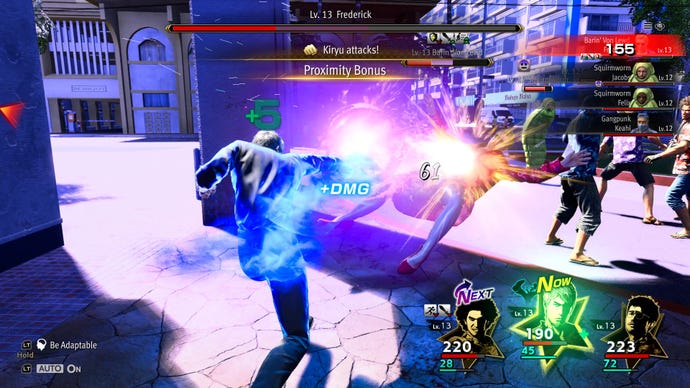
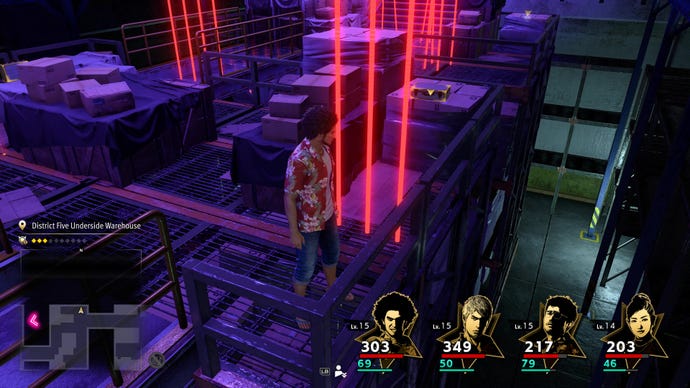
While east Hawaii's ruffians are weaker than your west variety, it's difficult to tell how much everyone's levels carry. There were times when I went up against some brutes around four levels higher than me and got obliterated. Then there were times when I tackled a gaggle of goons seven levels higher and emerged unscathed. Honestly, I do think the level balance is a little borked, and it can be especially frustrating as enemies' levels don't actually appear until a fight kicks off. Don't do a me folks: save regularly, lest you get battered.
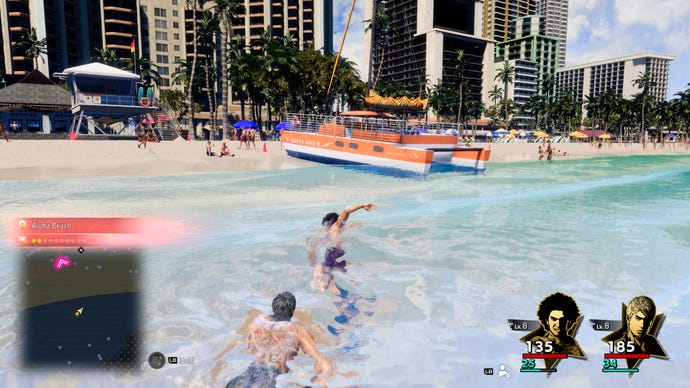
But I do think my surprise successes are, in part, thanks to turn-based tweaks to Yakuza: LAD's setup that let you better bend a disadvantage to a win. Now you're able to move in a small zone during your turns, which sounds like a little change but adds much needed variety. Rotate behind an enemy and you can lay down extra "Back Attack" damage, or you can sidle over to a nearby traffic cone to add a spot of thermoplastic to your slaps. The best thing about it, though? Fights turn into a game of skittles, as most foes can be smacked towards a pal, who'll then perform a follow-up haymaker (depending on the bond level, and therefore benefits, that you have with them).
Spells and attacks have been tuned a bit too, making everyone's suite of abilities more useful. Adachi's suplexes break guards, preventing enemies from hunkering behind titanium forearms, while Chitose's perfume bottle can spray multiple lads with a pungent debuff. And it's wonderful being able to inherit any skill from any Job later on, making it truly beneficial to have fun and experiment. The extra options aren't always enough to make regular battles less of a chore, but against tougher hoodlums they shine. Infinite Wealth's finally found the right blend of turn-based and chaos to graduate from an experiment that went well, to a series staple that feels uniquely Yakuza.
While some niggling Yakuza jank lingers, Infinite Wealth also retains what I believe to be the series' most important strength: comedy. Just like the rest of the series, the game vaults between absurdity and seriousness with confidence. Nancy the crawfish is now Ichiban's pet, and has a full on love story in the midst of everything. And I like how the devs have infused many of the side stories with Hawaiian culture and tourist silliness. I've helped a rockstar conjure a storm for his music video by going to a local shaman, and sort of laugh-cried at an old man trying to fulfil his wife's final wish to see snow. His way of going about it? Chucking shaved ice into the air. But it does the Yakuza thing! It goes so much deeper than shaved ice in the most unexpected of ways.
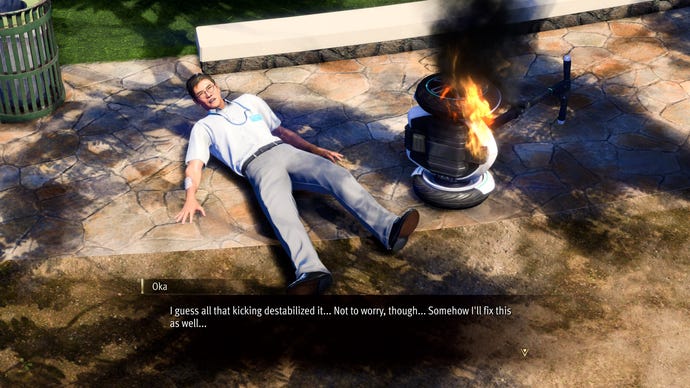
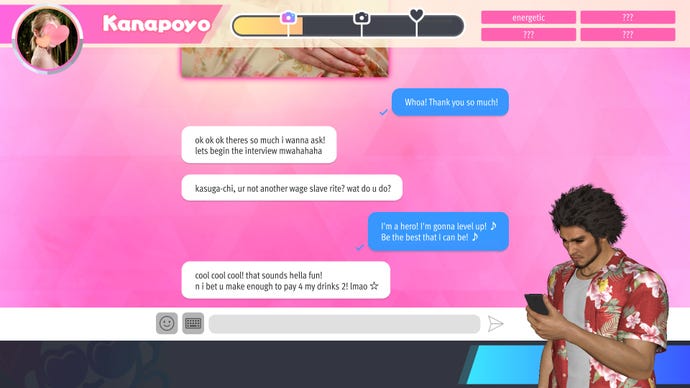
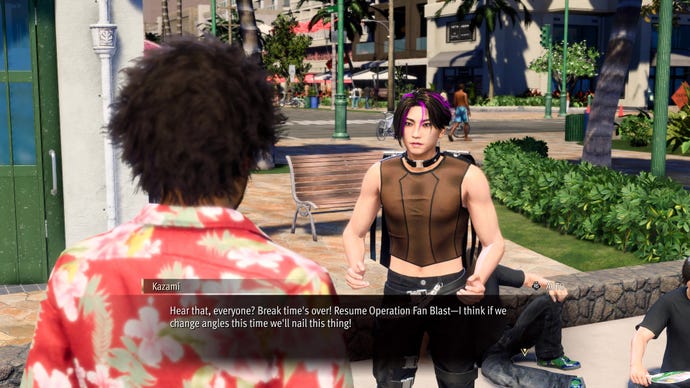
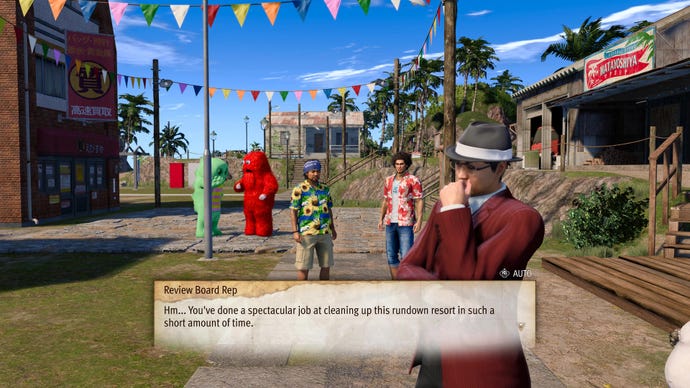
Yakuza's always been big on extra side stuff and Infinite Wealth has taken it up several notches, to the point where I could probably write two separate reviews for both of its offerings. The first is a Pokémon parody called Sujimon, where you capture, level up, and battle weird goons. The second is Dondoko Island, an Animal Crossing parody where you rejuvenate a polluted island and turn it into a tourist attraction. I think Sujimon's the lesser of the two (still a good laugh), whereas I can see myself losing hundreds of hours to what's a bit of a mash between AC and Yakuza's real estate mini games of the past. What's neat is you don't have to engage with either of them beyond their intros, but can reap big benefits if you do (extra currency, the odd special move, a Sujimancer Job).
Infinite Wealth is everything I wanted from a Yakuza: LAD sequel. It refines and expands on many of Yakuza: LAD's RPG loose ends or underexplored bits, whisking you away to the wonderful Hawaii in the process. Yes, it may be a bit too expansive for some, retains some of Yakuza's more annoying quirks, and isn't an RPG in the sense of making Ichiban's story totally your own. But the story it does tell, and the adventures you do go on, are heartfelt and funny and told with such rich detail. I'll say it again: thank goodness for Yakuza.
This review is based on a review build of the game provided by publishers Sega.
